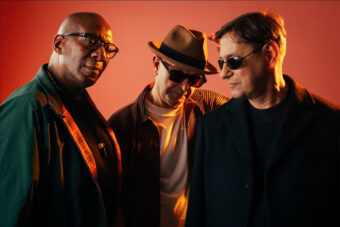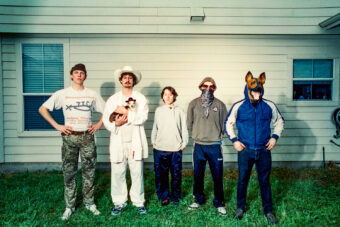By: Philip Sherburne If 1991 was the year punk so famously broke, ushering Nirvana and Sonic Youth into the mainstream and altering the face of pop music forever, 2002 was the year electronica went broke. With the Neptunes rocking Led Zep T-shirts and Burberry’s fashionably shaggy models forsaking the wheels of steel for mullets, drum kits and Stratocasters, electronic music got more play in football stadiums than nightclubs. But despite the bad press (or complete lack thereof), the past year brought forth some of the most exciting music ever to fall outside the categories of rock and rap, expanding the definition of “electronic music” with release after groundbreaking release. Some of these titles you’ve probably heard, and some you almost definitely haven’t (unless you’re as obsessive as we are).
If 1991 was the year punk so famously broke, ushering Nirvana and Sonic Youth into the mainstream and altering the face of pop music forever, 2002 was the year electronica went broke. With the Neptunes rocking Led Zep T-shirts and Burberry’s fashionably shaggy models forsaking the wheels of steel for mullets, drum kits and Stratocasters, electronic music got more play in football stadiums than nightclubs. But despite the bad press (or complete lack thereof), the past year brought forth some of the most exciting music ever to fall outside the categories of rock and rap, expanding the definition of “electronic music” with release after groundbreaking release. Some of these titles you’ve probably heard, and some you almost definitely haven’t (unless you’re as obsessive as we are).
V/A, Mali Music (Astralwerks) What happens when a rock star gets sick of stadium tours? If you’re Blur’s Damon Albarn, you head to Western Africa with nothing but a melodica in your carry-on and set up shop with some of the region’s most accomplished musicians. The result is a record experimental enough to give Radiohead a run for its money, but on Mali joy trumps angst, thanks to the way that dub, rock, and roots music render passports obsolete.

Also Read
Compact Discs: Sound of the Future
Boards of Canada, Geogaddi (Warp) Poster boys for ’60s commune-style living, the reclusive Scottish duo’s second proper album picks up where 1998’s Music Has the Right to Children left off. BOC are spiraling ever further into a future where the sun burns turquoise and telepathy’s nothing but a state of mind.
Caural, Stars on My Ceiling (Chocolate Industries) This Chicago-based Chocolate Industries label is sometimes thought too brainy for its own good, but Caural’s Zach Mastoon goes straight for the pleasure center with the fattest doobie hip-hop’s ever smoked. With old-school breakbeats and acoustic guitars as feathery as Farrah Fawcett’s hair, it’s pure nostalgia without the retro baggage.
Recloose, Cardiology (Planet E) On his debut full-length, Detroit’s Matt Chicoine beats Motor City techno with a sack full of oranges and then rubs it down with raw future soul. Dub, jazz, hip-hop, and house never sounded so perfect together.
Röyksopp, Melody A.M. (Astralwerks) These cagey Norwegians reinvent Chicago house music, enlisting Kings of Convenience’s Erlend Øye to wax up the dancefloor-friendly single “Poor Leno” with his folksy falsetto. Chock full of quirky keyboards and strange shards of Scandinavian humor, Röyksopp play like Zero 7 had they grown up north of the Arctic Circle.
Steinski, Nothing to Fear: A Rough Mix (Soul Ting) Over two years in the making, this BBC radio-produced mix of classic hip-hop, funk and soul has more cuts than Maggie Gyllenhaal’s inner thigh. The forty-something selector proves that even if students like DJ Shadow and Cut Chemist are all growed up, he’ll always be The Teacher.
Super_Collider, Raw Digits (Rise Robots Rise) Named after a particularly geeky software program, Cristian Vogel and Jamie Lidell’s Super_Collider shuns their native techno in favor of undead R&B that grunts, groans, and speaks in tongues over clubfooted Timbaland beats.
Various, Total 4 (Kompakt) Germany’s sleekest techno label indulges in a little ’80s fetishizing with a set full of electro glam that’s cheeky enough to be sexy but too subtle to be cheesy. The cover of Eno’s “Baby’s On Fire” will have you scrambling to find the original. Was he that cool the first time around?
Out Hud, S.T.R.E.E.T. D.A.D. (Kranky) Sacramento, California, may be a cow town, but it made city mice out of this five-piece outfit who churn out punked-up spacerock with a skyscraper headache and an asphalt kiss.
Anti-Pop Consortium, Arrhythmia (Warp) Way funkier than its title implies, the downtown trio’s swan song is a lumbering beast of freaky machine rhythms, squawk-box basslines, and freeform rapping that’s part cold chillin’, part cold fusion. Hip-hop for mad scientists and their basement disciples.
Schneider TM, Zoomer (Mute) Gummier than a bag of sour candies, this sugar-crusted pop masterpiece explores the candyland fantasy world where Kraftwerk and the Beach Boys run amok in a Ritalin daze.
Philip Jeck, Stoke (Touch) Hardly content to restrict himself to two wheels of steel, this conceptual turntablist links up dozens of secondhand record players, stirring up a dusty dreamscape out of as much vintage vinyl as he can juggle at once: an ambient, sandblasted vision of the thrift-store sublime.
DJ/rupture, Minesweeper Suite (Tigerbeat6) Madrid resident Jace Clayton puts mortal DJs to shame with this dizzying, hour-long mix of underground hip-hop, jackhammer industrial, screaming noise, geektronica, ragga, and even North African club jams.
Pantytec, Pony Slaystation (Perlon) When it comes to off-kilter beats, no one bests Germany’s Perlon imprint. Here, Zip and Sammy Dee rock wiry laptop techno that braids itself into a magic rope and climbs straight out of the stratosphere, raining down gravel and thumbtacks on all those foolhardy enough to stay behind.
Metro Area, Metro Area (Environ) Disco has never been hipper, thanks to New York’s Morgan Geist and Darshan Jesrani, who punctuate loping keyboard lines with hissing syn-drums and handclaps that carry the wallop of slamming doors. These boots were made for waltzin’.
RJD2, Dead Ringer (Definitive Jux) Cleveland’s RJD2 prolongs Def Jux’s hot streak (after wins by El-P, Cannibal Ox, and Aesop Rock) with this slab of scuzzy breakbeats and tarnished soul. Despite a passing resemblance to DJ Shadow’s deft edits and eclectic scope, the record’s a dead ringer for no one but its own bad self.
Loscil, Submers (Kranky) Vancouver, BC’s, Scott Morgan creates a brooding soundtrack for the half-life between waking and sleep. Brushed steel drones and runout-groove shuffles twirl together into a simmering, shimmering mass of amniotic comfort and earthbound longing.
Coloma, Silverware (Ware) Like a remake of Depeche Mode’s Black Celebration, this Düsseldorf-based duo comb brightly weeping keyboards through hushed tech-house loops, creating the perfect backdrop for Rob Taylor’s theatrical, but never overblown, refrains. Joy Division’s “Heart and Soul” meets New York disco Body & Soul.
Wobbly, Wild Why (Tigerbeat6) San Francisco’s Jon Leidecker scours the commercial hip-hop airwaves and scrapes out the resin, packing battle boasts and diva melismatics into his pipe before torching them with the sickest software around, letting it all go up in a puff of pixel-smoke.
Jonthan Bepler, Cremaster 3 Original Soundtrack (Jonathan Bepler) If you buy only one avant-classical soundtrack to an art-house flick about Vaseline sculptors, legless supermodels, and testicular muscles this year, make it this one. Bepler’s Theremin squeal, Gaelic ballads, and dark, massing string passages could change the way you think about, well, everything.



